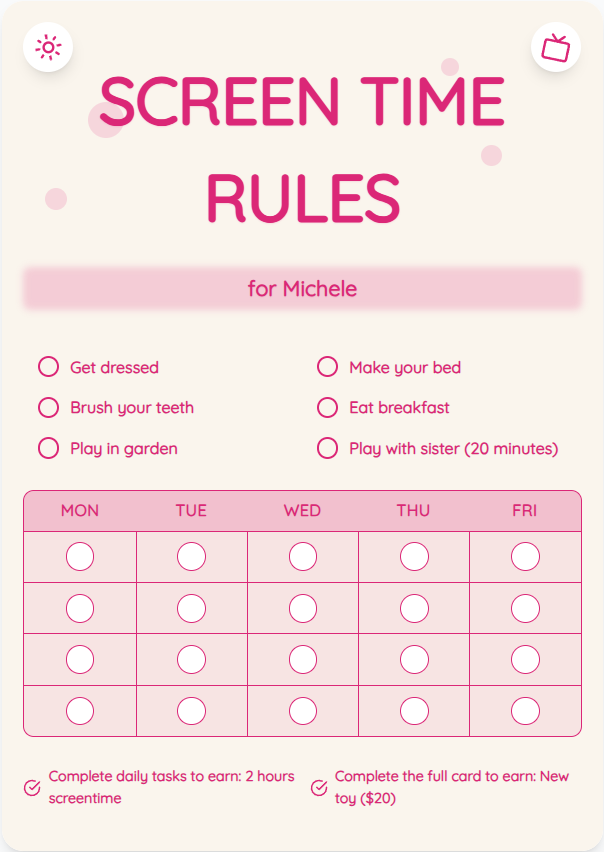Screen Time Guidelines Recommended by Schools: A Parent's Guide
As a parent, managing your child's screen time can be challenging. Schools play a crucial role in providing guidelines to help parents navigate this digital age. Understanding and implementing these recommendations can foster healthy screen time habits and promote overall well-being for your child.
See What Your Screen Time Chart Will Look Like
Here's an example of a beautiful, customizable screen time rules chart you can create for your family

Understanding School Recommendations
Schools emphasize the importance of setting limits on screen time for children. They recommend age-appropriate durations and types of media consumption. By following these guidelines, parents can support their child's development while mitigating the potential negative effects of excessive screen time.
Creating a Screen Time Schedule
Establishing a consistent screen time schedule is key. Allocate specific time slots for educational content, recreational activities, and family interactions. Schools often suggest using screen time charts to visually represent and manage allotted screen time effectively.
Put These Tips Into Action
Create a custom chart to implement these strategies with your child
Encouraging Balanced Activities
Schools advocate for a balanced approach to screen time by encouraging children to engage in physical activities, creative pursuits, and social interactions offline. Encourage your child to explore various interests beyond screens to promote holistic development.
Practical Tips for Success
- Set clear boundaries and communicate them effectively with your child.
- Engage in screen-free activities as a family to model healthy behavior.
- Use screen time as a reward for completing tasks or chores.
- Encourage outdoor play and hands-on learning experiences.
Frequently Asked Questions
How much screen time is recommended for my child?
Schools typically recommend no more than 1-2 hours of screen time per day for children aged 2-5, and up to 2-3 hours for children aged 6-12. However, individual needs may vary, so it's essential to monitor your child's behavior and adjust accordingly.
Are all types of screen time equal?
Not all screen time is created equal. Schools advise prioritizing educational and interactive content over passive entertainment. Encouraging your child to engage with high-quality, age-appropriate media can enhance learning experiences.
How can I limit my child's screen time without conflicts?
Establishing clear rules and routines around screen time from an early age can help reduce conflicts. Involve your child in setting limits and involve them in creating a screen time schedule. Consistency and positive reinforcement can also aid in managing screen time effectively.
By following the screen time guidelines recommended by schools and implementing practical tips, you can create a balanced approach to screen time for your child. Remember, moderation is key in fostering healthy habits. Explore the benefits of using screen time charts to streamline the process and promote family harmony.
Ready to Transform Your Family's Screen Time?
Join thousands of parents who have successfully managed screen time with our customizable charts.
